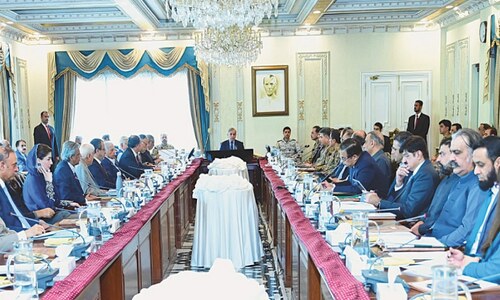ISLAMABAD: The Pakistan Tehreek-i-Insaf ally Sheikh Rashid Ahmed may have come to the Supreme Court on Wednesday to advise the honourable judges to steer clear of the prevailing political quagmire, but he left the court with orders to find a way to end this impasse, after consulting with the leaders of the protesting parties so that key premises such as parliament and the secretariat could be vacated.
Similar directions were issued to the political parties represented in the parliament, whose representatives appeared following notices issued to them on Tuesday.
The five-member larger bench headed by Chief Justice Nasirul Mulk was hearing identical petitions challenging the continuing anti-government sit-ins.
The political parties were asked to present suggestions and solutions that may help end the over three-week sit-in in their replies to petitions moved by a number of high court bar associations. The case is now expected to be taken up on Friday.
Mian Raza Rabbani, a Pakistan People’s Party senator who appeared on behalf of the Baloch National Party and Awami National Party, told the court that the federal character — a distinct and basic feature of the Constitution after the 18th Amendment — was threatened by the prolonged crisis.
“Keeping in mind the demand for the dissolution of the assemblies, we have to consider how far the concept of federalism could be trampled by doing away with the provincial assemblies’ mandate of five years,” the senator mused.
During the hearing, Justice Anwar Zaheer Jamali asked Attorney General Salman Aslam Butt to submit details of the economic, diplomatic and legal losses sustained in this period. He was directed to collect figures from the commerce department, as well as finding out how many FIRs had been registered over deaths and injuries, against the storming of buildings such as PTV and the torching of private vehicles and motorcycles.
But Justice Asif Saeed Khosa asked Mr Rabbani to suggest how the Supreme Court could help find a legal way out of this quagmire, when the constitution seemed to offer no recourse on the rigging controversy.
“Thus far, we have only discussed the fall-out from this sit-in, which is a side issue. But we are not attending to the root cause,” the judge observed.
Mr Rabbani reminded the court that Article 225 of the Constitution stipulated that no-one except an election tribunal could question the results, but agreed that there was a need to legislate on the matter. He hastened to add that he would propose suggestions for a peaceful settlement of the dispute in his reply, expected to be filed on Friday.
At the outset, Aitzaz Ahsan, who appeared on behalf of the PPP, sought an order to vacate the ‘tent village’ that had emerged on the premises of Parliament House.
“The parliament is as sacred and a glorified institution, just like the Supreme Court,” he said.
But the chief justice observed that the speaker of the National Assembly was the competent authority to pass such an order.
Earlier, Sheikh Rashid told the court that the protesters had great respect for the Supreme Court, but that they were adamant in their protest. He also contradicted the contention that parliament was under siege, saying that a joint sitting of both houses was being held in the house.
He said the entire nation trusted the Supreme Court and, therefore, it should not interfere in political matters, adding that the protesters were willing to return to the streets if they were assured that there would be no action against them. He said that the real inconvenience to the people was being caused by the placing of containers at key points, hindering free movement in the capital.
When asked about the body searches being carried out by the protesters, he apologised and said he would do his best to ensure this did not happen again. However, he maintained that this was a precaution to avoid an untoward incident.
Justice Saqib Nisar lamented that despite commitment made to the Supreme Court by the protesting parties that they would abide by the constitution, the secretariat had virtually become non-functional, while the Federal Board of Revenue, Election Commission of Pakistan and Federal Shariat Court had been inaccessible for the past 17 days.
Published in Dawn, September 4th, 2014















































Dear visitor, the comments section is undergoing an overhaul and will return soon.